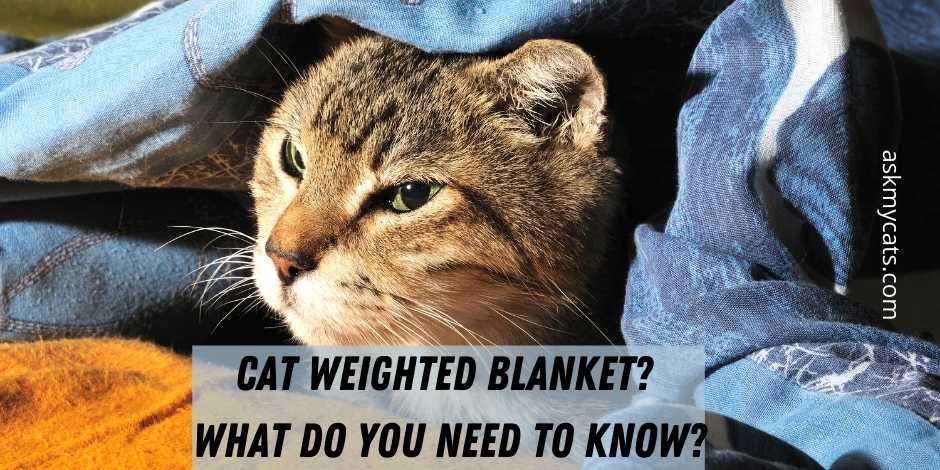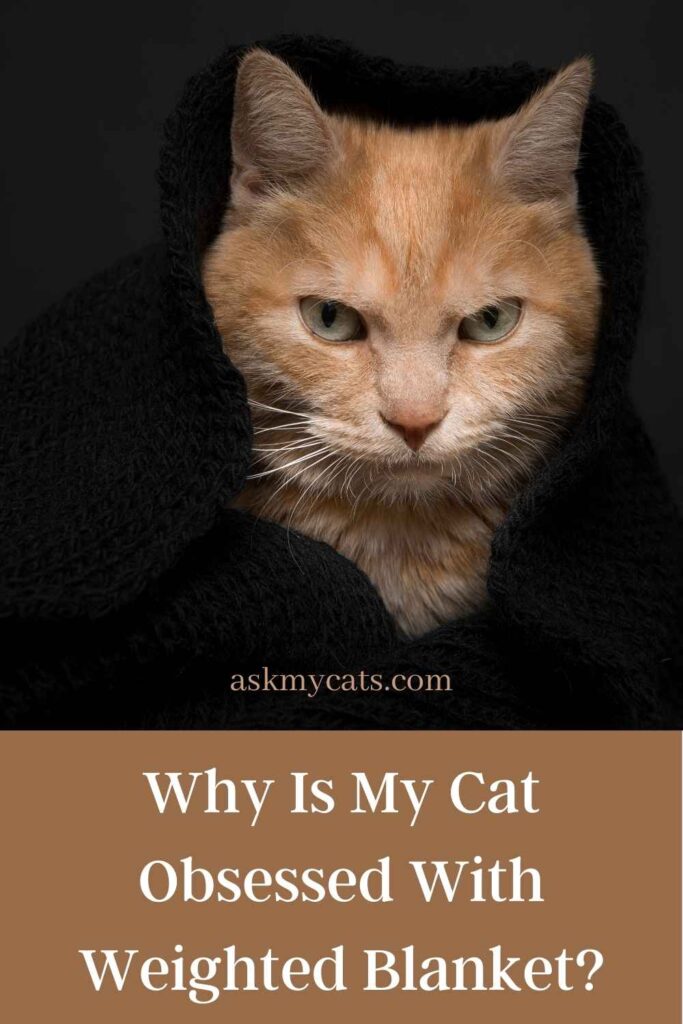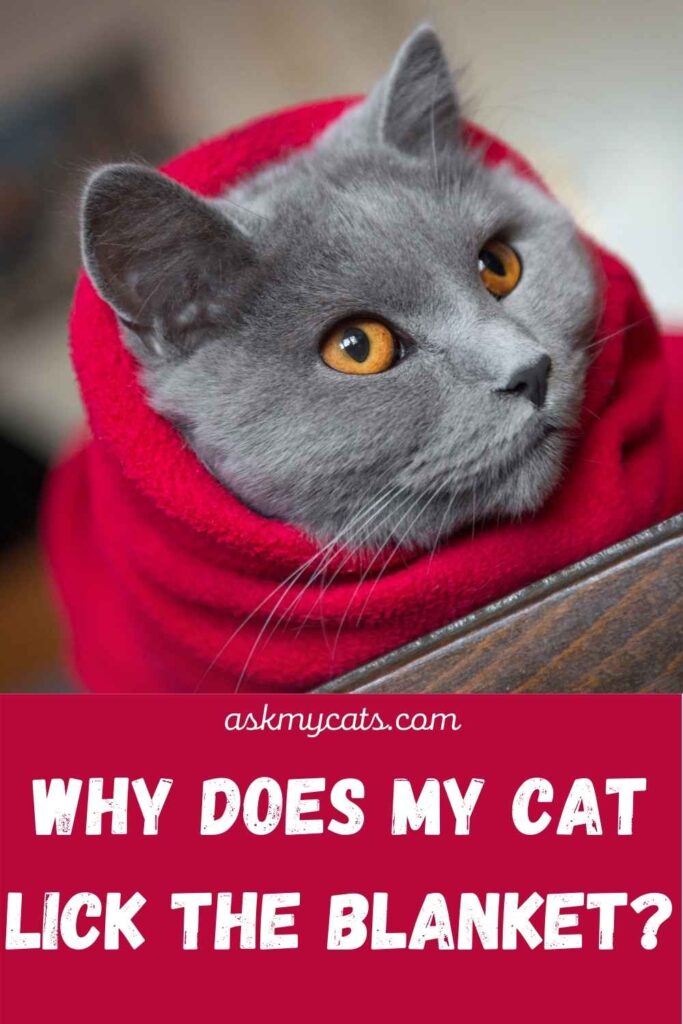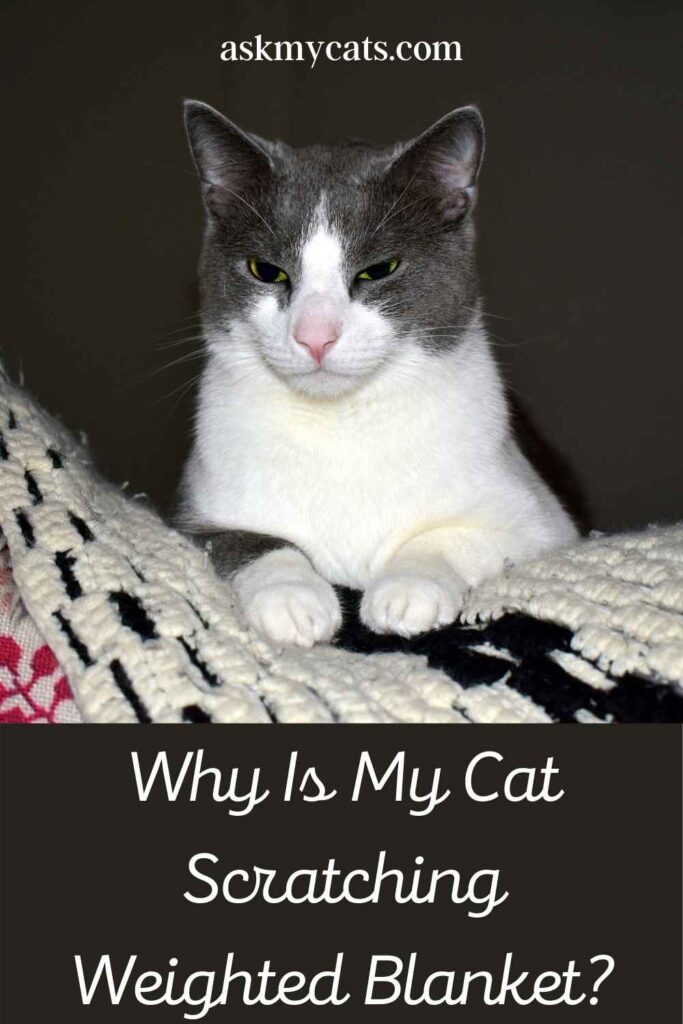Weighted blankets are equivalent to extreme pressure treatment in that they can be used at home (DPT).
The blanket works as an embrace, using deep pressure to make you feel more comfortable.
DPT is the use of supportive pressure, such as a hug, to help relax the central nervous system and, they’ve been shown to help calm a tense body, stabilize the nervous system, stimulate serotonin production, and cause and enhance sleep problems.


Give Your Cat the Perfect Day
Get the Free Ebook!
Are Weighted Blankets Safe for Cats?
No, Weighted blankets may tend to create problem or suffocation for our pet cats because our weighted blankets can feel like a Goliath weight on top of our tiny fur mates, even if they aren’t that heavy for us humans.
When a cat or dog rests under one, the only problem being that it can become too heavy for them to quickly get up or walk about.
Weighted blankets are ideal for those looking for a more comfortable, restful night’s sleep. They are often packed with small glass or plastic beads to provide the pressure and weight.
People with insomnia, anxiety, depression, autism, PTSD, OCD, restless leg syndrome, and chronic pain have all been found to benefit from them in studies.
You should choose a weighted blanket that is around 10% of your body weight, since weighted blankets usually range from five to thirty pounds.
When the weight is uniformly dispersed from your chest to your toes, they perform best. To stop overheating, I also suggest a blanket made of breathable material.
Some cats may panic under the blanket, causing them to become more stressed. Additionally, the weighted blanket can be too cumbersome for cats, little dogs, elderly dogs, or dogs with chronic respiratory problems, causing respiratory discomfort.
Any cover or weighted substance your pet sleeps under should be less than 10% of their body weight, similar to the weighted blanket guideline for humans.
A 10-pound cat, for example, should curl up under a blanket weighing no more than one pound, and a 20-pound dog should curl up under a blanket weighing no more than two pounds.
Another feature of human weighted blankets is that the majority of them are made of tiny beads to add weight. This might put pets at risk of choking.
If your cat is a chewer or has a habit of chewing and destroying objects while stressed, the beads could easily be swallowed. Ingestion of the beads or a portion of the blanket will cause a blockage in the GI tract, so be cautious.
When you have a cat or puppy, you don’t have to get rid of your weighted towel, but you can be careful how you use it. If your pet lies in your tent, make sure they’re on top of the weighted blanket rather than beneath it.
Why Is My Cat Obsessed With Weighted Blanket?
A weighted blanket has the right combination between softness and solidity for your cat to strike and play with.
It is much like capturing a mouse, rodent, or other large animal, or battling another cat (without the disadvantages of tackling something that can fight back).

One of my cats has a habit of running down the corridor, crashing into one end of the thick bathroom rug, bunching it up, then grabbing it and flopping over like a takedown, biting and using the kickers all at once.
This looks a lot like what you’re describing as being obsessed. My cats have gone for a variety of items, or none at all in some situations (pretend predation is a customary behaviour for cats but not a universal one).
Although your weighted blanket may not be the best place for Fido to hide, there are weighted dog blankets and other sensory items designed specifically for dogs, such as burrowing cave/covered cat and dog beds and hug-like, that can have similar benefits.
Pets will benefit from these close, pet-approved sensory devices in the same way as humans can benefit from the relaxing, soothing benefits of a weighted blanket.
This is particularly true for our furry companions who suffer from anxiety.
Pacing, chasing you around the home, hiding, jumping, breaking toys or your possessions, and vocalising are also symptoms of fear in cats.
They may even have gastro-intestinal problems like diarrhoea or vomiting, a loss of appetite, or also mild symptoms like licking their lips or yawning excessively.
Since cats are more independent, they express their tension in a different way than dogs. Hiding, hissing or offensive behaviour, urinating outside the litter box, weight loss, excessive shaving, vomiting, and reduced appetite are some of the symptoms.
Keep an eye out for those signs and contact the veterinarian if you see any to make sure there’s nothing more urgent going on.
If your pet is diagnosed with anxiety, a sensory pet product could be able to help alleviate any of the symptoms.
Some dogs and cats tend to hide under blankets or retire to a secure location with a covering over their heads. It’s in their nature to check out comfortable areas where they can feel comfortable and wet.
Why Does My Cat Lick The Blanket?
Your cat is unwinding by sucking on blanket or other materials. Since this behaviour reminds her of being protected and surrounded by her mother and littermates, a sensitive kitten may grow up to become a fabric-sucking cat.

Pica is a term used to characterise the need to consume inedible objects, and it is not unusual in cats. Pica deficiency usually indicates severe nutritional deficits in existing diets, necessitating immediate care.
Pica will cause many blockages in the intestines if not handled correctly, which is very risky for your pets. If you think your pet has pica disease, take it to a veterinarian.
To be healthy, cover everything your cat might chew on, including the towel, before the vet gives the all-clear.
Cats have an excellent sense of smell, so they should be able to spot spilled foods and beverages with ease.
As a result, whenever you accidentally smear your blanket with those scents, your furry friend will hop on the piece of cloth anytime it can.
Fortunately, this is a simple problem to solve; all you have to do is wash your blanket.
If your cat keeps returning to the blanket, you should spray it with repellent scents to make it less appealing to the cat. And better, make sure the space is completely sealed so that the mischief-maker is unable to access the blanket and create havoc.
Cats get nervous as they are exposed to unexpected transitions and unfamiliar situations, and they will do anything to alleviate their fear.
Most female cats clean themselves on a regular basis, and this grooming will also hit things around them, such as blankets.
To stop the licking and biting, you must first deal with the cat’s fear by playing with it.
Cats crave consistency in their routines and behaviours, so if you look after your cats, things can improve in no time. If you’re thinking of giving your pet something to help with fear, talk to your veterinarian first.
Cats like to knead on something that has their owner’s smell on it while they’re relaxing, and in many instances, the blanket happens to be nearby. This is the least concerning of the solutions to the question of “why do cats lick blankets.”
If you want to keep your blanket clean and comfortable, you’ll need some training sessions so your cat will continue to knead throughout its life. Aside from that, you have little to be concerned for because your pet is free of physical or mental illnesses.
Once you’ve ruled out any of the above reasons, you’ll have to admit that your cat simply enjoys licking sheets. There’s no particular significance to it, and as long as the pets don’t swallow the fibre loops, licking is perfectly healthy.
However, if you believe the licking is causing you problems, you should still turn to the veterinarian for assistance. In certain cases, a mixture of specialized medications and tension control techniques may be enough to treat compulsive licking.
Why Is My Cat Scratching Weighted Blanket?
Cats can scratch on a blanket before settling down to sleep to make them more relaxed and unwind.
Scratching on blankets and other objects is a natural instinct in cats. It is not caused by splitting or weaning a kitten from her mother too early, contrary to popular belief.
Unless the kitty begins to suckle on the blanket cloth and eat it while kneading, the action is normally harmless.

Pica is a disorder that occurs when cats eat non-food items such as blankets.
If you find this behaviour in your cat, take him to the vet for a check-up since ingesting fabrics can induce an intestinal blockage that may signify a medical problem.
Be sure your cat has things to chew on that can withstand sharp kitty claws and teeth without falling apart.
Cats normally knead while sitting quietly on a rug, and their claws may extend into the blanket’s fabric as they do so.
Scratching, on the other hand, can be destructive. It happens as the cat extends her front paws horizontally or vertically and draws them in into herself, sharpening both claws.
While kneading is usually not harmful, if your heirloom blankets or quilts are being damaged by kitty’s kneading, keep them out of control.
If you see her kneading on something improper, gently guide her to a rug where she can knead freely.
To keep your cat from kneading on heirloom pieces, cover them with aluminium foil or upside-down plastic carpet runners. Cats don’t like the texture of these textures on their paws.
Why Is My Cat Attacking My Blanket?
Cats normally strike as a challenge, an attack, or a defensive move. If this is happening to you, it’s possible that your cat is attempting to decide who is in charge. Biting is often used to convey information.
One of the most common reasons cats bite their owners’ blankets is that they haven’t outgrown their kitten-hood routine.
When they come across a fuzzy rug, it reminds them of their kitten-hood kneading, licking, and biting act. The blanket is chewed by cats in the hopes that it can yield milk.
Play with your cat until bedtime to avoid it. Before he goes to bed, get it out of his system. He’s punching your feet because you’re moving them, so she sees that as a challenge.
If you tie a toy to your foot so that your cat can see two objects going, there’s a 50% chance he’ll reach after the toy.
What To Do If My Cat Keep Peeing On Weighted Blanket?
Since cat urine is extremely acidic, it can be difficult to remove set-in stains on weighted blanket. If the stain is already sticky, soap and water should be enough to remove the stain and pungent odour.
For dried-on stains, an enzyme laundry stain remover can be applied directly to the stain or dissolved in the cleaning water. If the scent of urine persists after the first bath, repeat the process before drying the rug.
Due to the weight of the blankets, machine washing is not recommended, although certain commercial laundromats might be able to do it if you ask the supervisor first.
Since the pee would not be absorbed by the glass beads, you just need to be concerned with the cloth cover (e.g. no bleach or fabric softener to be used, etc). It should be fine to wash your hands!
It’s a kind of territorial mating. Your cat is basically marking his territories with his pee. While it’s perfectly natural for the cat, it’s a major hassle for the owner, who is left irritated and perplexed.
Urine spraying is typically a mating practise, but it may also indicate terror, tension, or anxiety.
Veterinarians look for health issues such as kidney failure, hyperthyroidism, diabetes, crystals in the urine (a potentially life-threatening situation in male cats), bladder stones, or bladder irritation exacerbated by an infection or even stress when cats urinate anywhere other than their litter boxes.
Frequently Asked Questions
Are weighted blankets safe for cats?
There are currently no weighted blankets intended exclusively for use on pets, but there are some vests and wraps available to help dogs and cats cope with fear. The same idea applies to why these vests and wraps fit in humans.
Do cats like being wrapped in blankets?
Cats do like blankets in general. Of course, they may differ in terms of the kind of blanket they choose, as well as how and where the blanket is put, but cats in general like blankets. This is especially true in the winter.
Final Words
Allowing your cat to sleep under your weighted blanket is not a good idea. A weighted blanket is not suitable for cats (or small dogs) to sleep under because it is too large for their small body.
If your cat crawls under a weighted towel, he or she will not be able to climb out without help.
Heavy blankets packed with plastic or glass beads are known as weighted blankets. Pressure therapy, or a calming level of pressure applied around the whole body, is used with these blankets to help ease anxiety, disturbed body problems, and other sleep problems.
Purchase a weighted blanket that is about 10% of your body weight, according to sleep experts. This means the adult weighted blankets typically weigh between 10 and 30 pounds.
Don’t forget to drop down your suggestions in the comments section below!
